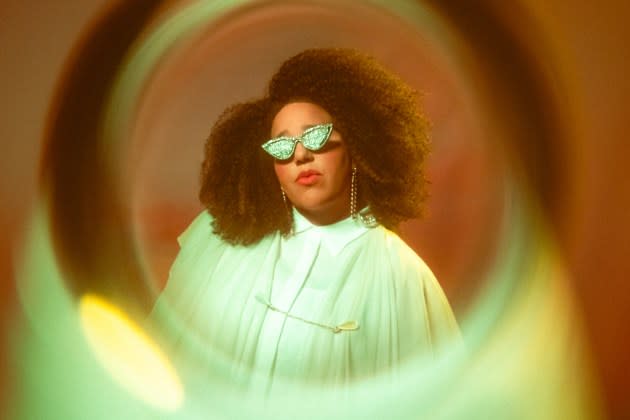Brittany Howard Makes Her Own Future on ‘What Now’
- Oops!Something went wrong.Please try again later.

“I’ve been staying open, you don’t wanna grow,” Brittany Howard sings on the title track from her second solo record. The song is a hard-funk failing-relationship jeremiad that might leave the “you” in question reduced to a puddle on the floor by the time it’s done. But whoever she’s singing to should’ve known better. Staying relentlessly open has been Howard’s guiding principle going all the way back to her breakout moment fronting Athens, Alabama garage-rockers Alabama Shakes in the early 2010s.
She’s a master of making forward-moving music that still passionately honors tradition. The Shakes quickly went from the ecstatic down-home rock & roll of their 2012 debut, Boys & Girls, to the raw psychedelia of 2015’s Sound & Color. That year, Howard also cut a fun record with the Nashville band Thunderbitch that sounded like the New York Dolls crushing a Floribama keg party. When the Shakes went on hiatus, she delivered her solo debut, Jaime, deepening her music’s rock-soul roots as well as its spiritual, personal, and political underpinnings in ways that felt ravenously brand new. In 2021, she gave us Jaime (Reimagined), with contributions from Childish Gambino, Earthgang, and Bon Iver, among other like-minded sonic question-askers.
More from Rolling Stone
Brittany Howard's Actions Speak Louder Than Words on New Single 'Prove It to You'
Brittany Howard Announces New Album 'What Now,' Shares Title Track
What Now is another side of Brittany Howard that makes each of her previous departures feel like a baby step by comparison. “Earth Sign” opens with a spacious avant-jazz pastorale that gets bigger, stronger, and grittier as it builds to a sunburst climax. “I Don’t” is a yearning Philly soul reverie. “Prove It To You” suggests Prince getting busy in the studio after coming home from a U.K. tour in the late Eighties with an armload of acid house records. “Samson” is a strikingly low-key ballad that evolves into molten fusion drift lifted by Rod McGaha’s trumpet, bringing to mind the softer, more fluid meditations of mid-Seventies Miles Davis. By the time you reach the album-ending “Every Color in Blue,” with liquid In Rainbows-era Radiohead guitar backing Howard’s powerhouse Nina Simone-esque vocals, what should be a willful marriage of opposites feels stunningly natural.
Howard, who recorded the album in Nashville with producer Shawn Everett, is on point in every setting, a careful, empathetic, authoritative soul singer who’s also a hot, explorative guitar player. The album’s constantly shifting tone is the perfect backdrop for lyrics that map out the embattled middle-spaces of love, always with an eye towards the emotional ironies that undergird, embolden, and/or problematize desire. “How long I’m I supposed to wait before I tell you I love you,” she proffers against the bass pops and boom-bap of “Patience.” All over the album, Howard makes something new out of honeyed romantic idioms, the same way she plays in the free spaces between vintage musical settings. “You have the power to undo everything that I want,” she sings on “Power To Undo,” one of the album’s most combustable Prince reclamations. It sounds like a sentiment we’ve heard before, until you take a step and process the individualized heartache at its center.
“Red Flags” leaps and twists and doubles in on itself, at once elated and contorted, just like the feelings Howard unpacks when she sings, “The best times that I ever had, that’s when the worst times started.” That’s rough. And that’s exactly what makes What Now such a strange rush: This is a record that reminds how many worlds exist between pleasure and pain.
Best of Rolling Stone
